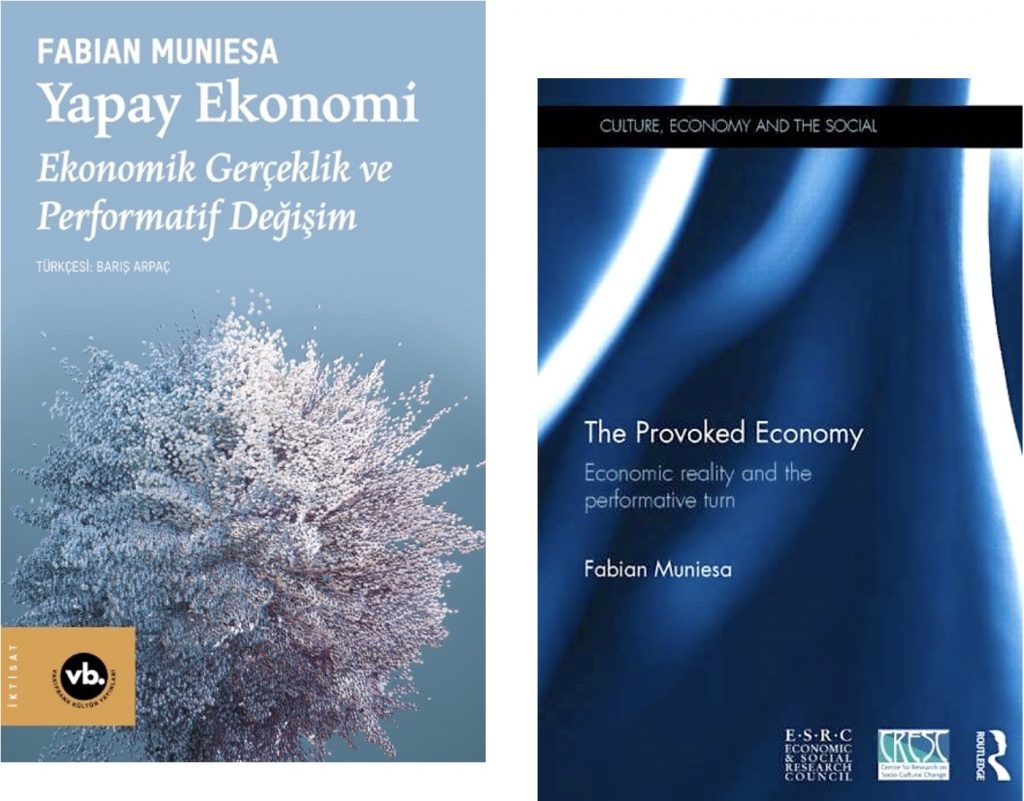Just published from Vakıfbank Kültür Yayınları (Istambul): Fabian Muniesa, Yapay Ekonomi : Ekonomik Gerçeklik ve Performatif Değişim, a translation by Barış Arpaç of The Provoked Economy: Economic Reality and the Performative Turn published by Routledge in 2014.

Back cover:
”Belirtmeye çalıştığım şey tek bir finansal nesnenin mali değerinin bir tacir, satış sorumlusu, arka ofis çalışanı, risk yönetimi uzmanı, muhasebeci ya da avukat tarafından farklı bağlamlarda değerlendirilebileceği ve bu bağlamların her daim birbiriyle uyumlu olmadığıdır. Bu durum organizasyonda bir hata olduğunun, bankanın değerleme hakkında tek bir prensip belirlemekte başarısız olduğunun bir kanıtı mıdır? Durum pek öyle değil…”
Performans göstergeleri, değerleme formülleri, tüketici testleri, hisseler ya da finansal sözleşmeler gibi şeyler dışsal bir gerçekliği mi temsil ederler? Yoksa işaret ettikleri şeyi performatif bir biçimde oluştururlar mı?
Yapay Ekonomi, ekonomik gerçekliği sürekli tasvir edilen bir gerçeklik olarak kabul ediyor ve bu süreci pragmatist bir bakış açısıyla ele alıyor. Kitap, ekonomide bir “şey”in nasıl meydana çıkarıldığına dair süreci keşfetmek için okuyucusunu bir seri farklı ampirik alanda –kamu yönetiminden borsaya, yatırım bankalarından pazarlamacılığa ve işletme fakültelerine– bir gezintiye çıkartıyor. Ekonomik nesnelerin tasvirinin aslında ekonomik nesneleri ürettiğini ve bir ekonomik eylemin simülakrumunun, bir gerçekleşme formu olduğunu gözler önüne seriyor. Ayrıca neyin ekonomik olup olmayacağının tartışmaya tabi olduğunu ve ekonomik gerçekliği sürekli tasvir ederek şekillendirmenin, uygulamalı bir sınavla yüzleşmek demek olduğunu gösteriyor.
Do things such as performance indicators, valuation formulas, consumer tests, stock prices or financial contracts represent an external reality? Or do they rather constitute, in a performative fashion, what they refer to?
The Provoked Economy tackles this question from a pragmatist angle, considering economic reality as a ceaselessly provoked reality. It takes the reader through a series of diverse empirical sites – from public administrations to stock exchanges, from investment banks to marketing facilities and business schools – in order to explore what can be seen from such a demanding standpoint. It demonstrates that descriptions of economic objects do actually produce economic objects and that the simulacrum of an economic act is indeed a form of realization. It also shows that provoking economic reality means facing practical tests in which what ought to be economic or not is subject to elaboration and controversy.
This book opens paths for empirical investigation in the social sciences, but also for the philosophical renewal of the critique of economic reality. It will be useful for students and scholars in social theory, sociology, anthropology, philosophy and economics.
Routledge, 2014

